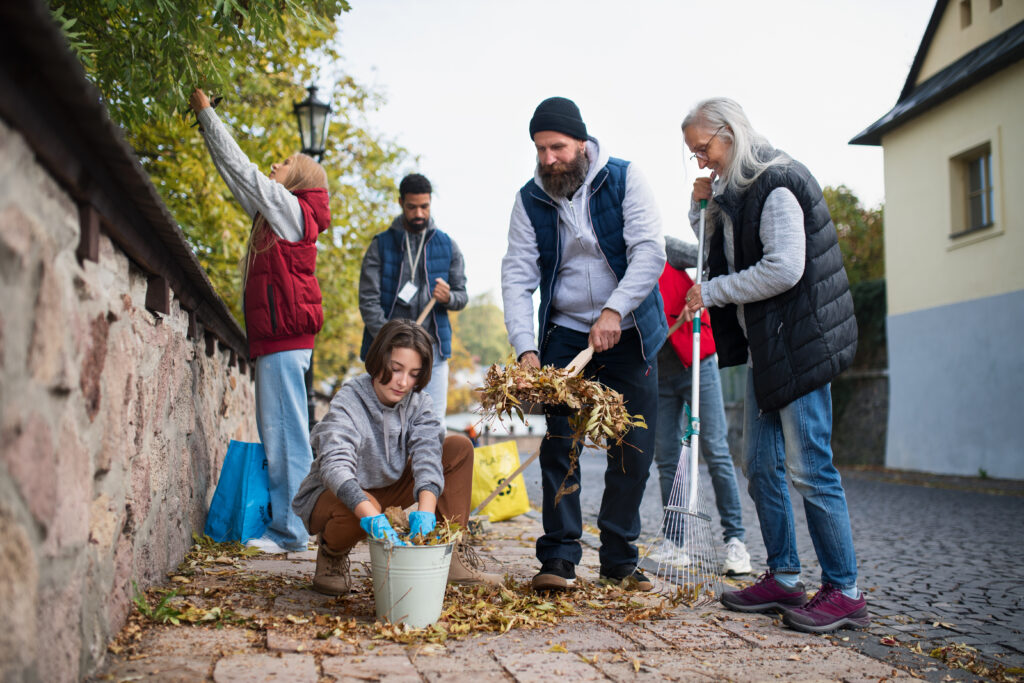Why Is Service Work an Important Part of Recovery from Substance Use? Exploring Key Benefits

Service work plays a crucial role in recovery from substance use. Helping others can provide a sense of purpose and community, which are essential for staying sober. This connection can be a key factor in maintaining long-term recovery.
When people engage in service work, they focus less on their own struggles. It helps build self-esteem and brings a sense of accomplishment. These positive feelings are important for anyone combating addiction.
By participating in service work, individuals can also develop healthy relationships. These new connections can be a strong support system. This leads to a healthier lifestyle and a more positive outlook.
Understanding Substance Use Disorder
Substance use disorder is a complex condition that affects the brain and behavior. It causes an uncontrollable need to use substances despite harmful consequences.
Defining Recovery
Recovery from substance use disorder is a lifelong journey. It involves stopping drug or alcohol use and learning new ways to live without substances. Recovery includes developing healthier habits and improving physical and mental health. Support from family, friends, and professionals is often essential. Recovery can also mean attending support groups or therapy sessions regularly. Success in recovery often requires understanding the triggers that lead to substance use and finding ways to handle them.
The Chronic Nature of Addiction
Addiction is a chronic condition similar to diseases like diabetes or heart disease. It means that it is a long-term issue that needs ongoing management. Even after stopping substance use, the risk of relapse remains. This chronic nature makes it important for individuals to stay engaged in treatment and support activities. There are physical and psychological aspects of this condition. Treatments may include medications, therapy, and lifestyle changes to manage this disease effectively.
Stigma and Mental Health
Stigma around substance use disorder can make recovery harder. People may feel ashamed or judged, which can prevent them from seeking help. This stigma can come from society, workplaces, or even friends and family. It’s important to treat substance use disorder like any other medical condition. Mental health can be severely impacted by both the substance use and the stigma. Many who struggle with substance use disorder also experience other mental illnesses like depression or anxiety. Support and education can help reduce stigma and improve recovery outcomes.
Components of Effective Recovery Programs
Effective recovery programs combine various elements to support individuals in their journey towards sobriety. Key components include a mix of treatment approaches, medications, and continuous care.
Role of Treatment and Recovery
Treatment and recovery programs often start with detoxification. This helps remove harmful substances from the body.
Therapy is crucial. Cognitive Behavioral Therapy (CBT) helps individuals understand and change their thought patterns. Group therapy offers peer support.
Inpatient and outpatient programs provide different levels of care. Inpatient treatment is more intensive and suitable for severe cases. Outpatient programs allow greater flexibility and can be ideal for those with milder conditions.
Medication-Assisted Treatment Options
Medication-Assisted Treatment (MAT) uses medications like methadone and buprenorphine. These help reduce withdrawal symptoms and cravings.
MAT is effective for treating opioid use disorder. It can also help with alcohol dependence, using drugs such as naltrexone or acamprosate.
MAT should be combined with counseling and behavioral therapies. This ensures a more holistic approach to treatment, addressing both physical and psychological aspects of addiction.
Healthcare providers closely monitor patients on MAT. They adjust dosages and manage any side effects.
Continuing Care and Aftercare
Continuing care is vital for long-term recovery. It includes ongoing counseling, support groups, and regular medical check-ups.
Aftercare plans might involve staying in sober living homes. These environments provide structure and support.
Relapse prevention strategies are part of aftercare. Individuals learn coping mechanisms to handle triggers and stress.
Regular check-ins with a counselor or support group help maintain progress. This ongoing support reduces the risk of relapse and enhances overall well-being.
The Importance of Community Support
Community support plays a crucial role in recovery from substance use. It helps individuals build social networks, find mutual help organizations, and access necessary community resources, enhancing their recovery capital.
Building Social Networks
Social networks are essential for someone in recovery. Connecting with others who understand their experiences can reduce feelings of isolation. Friends and family can provide emotional support and encouragement.
By expanding their social network, individuals can find new, healthier relationships. Social networks offer practical help, like finding housing or jobs, and boost emotional well-being. Recovery becomes a shared journey, making it easier to stay motivated and avoid relapse.
Mutual Help Organizations
Mutual help organizations such as Narcotics Anonymous (NA) provide a structured environment where individuals can share experiences and receive support. These groups create a sense of belonging and understanding that can be crucial for long-term recovery.
Regular meetings offer a reliable schedule and a chance to build supportive relationships. Acting as both a community and a resource, these organizations often include sponsors who provide one-on-one guidance. This peer-driven support is crucial for maintaining sobriety.
Community Resources and Recovery Capital
Access to community resources increases an individual’s recovery capital, the assets they can draw upon for support. These resources might include treatment programs, job training, and housing assistance.
Adequate recovery capital improves one’s ability to navigate challenges and maintain sobriety. Community resources can also include educational opportunities and health services, all contributing to a more stable and healthy lifestyle.
Building a solid foundation through these resources ensures that individuals have the support needed to sustain their recovery journey.
The Role of Service Work in Recovery

Service work plays a crucial role in recovery by helping individuals build empathy, gain a sense of purpose, and become an integral part of their communities. It offers numerous advantages, including improved self-efficacy and opportunities for meaningful employment.
Developing Empathy and Self-Efficacy
Service work helps individuals develop empathy by putting them in positions where they can help others. By connecting with people who are facing similar struggles, they learn to understand different perspectives and emotions. This experience can be empowering.
Increased self-efficacy is another key benefit. Achieving small goals through service work reinforces a sense of accomplishment. This, in turn, boosts confidence and motivates individuals to maintain their recovery journey. It’s important for people in recovery to see their positive impact.
Volunteering and Contribution
Volunteering provides a sense of purpose. Engaging in activities that benefit the community makes individuals feel needed. It creates a routine and gives structure to their days, promoting stability.
Furthermore, the social aspect of volunteering helps break the isolation often felt during recovery. Being part of a team fosters a sense of belonging, aiding emotional healing. Many find that giving back improves their mental and emotional well-being.
Joining the Recovery Workforce
Employment within the recovery workforce offers a unique opportunity for those in recovery to stay connected with their journey. Roles like recovery coaches and peer recovery specialists are invaluable. These positions allow individuals to use their personal experiences to guide others.
This employment not only provides financial stability but also reinforces their recovery. Working in a supportive environment helps maintain sobriety and fosters professional growth. Helping others navigate their recovery journey can be a fulfilling career path.
Life Skills and Personal Development

Building life skills and personal development is key during recovery from substance use. It includes setting goals, maintaining balance, practicing self-care, improving physical health, and building self-confidence and accountability.
Goal Setting and Balance
Setting goals helps individuals stay focused and motivated. Small, achievable goals can build momentum.
Having a balance between work, leisure, and recovery activities is important. It prevents burnout and ensures that various aspects of life are attended to.
Daily routines, exercise, and hobbies can offer structure and reduce the temptations of old habits. Balance enhances the quality of life and supports long-term recovery.
Self-Care and Physical Health
Practicing self-care is essential. It includes getting enough sleep, eating healthy, and staying active. Self-care reduces stress and increases energy levels.
Physical health plays a big role in recovery. Regular exercise helps the body heal and boosts mood through the release of endorphins.
Incorporating self-care routines can make recovery smoother. It shows self-respect and contributes to an overall sense of well-being.
Building Self-Confidence and Accountability
Recovery strengthens self-confidence. Believing in one’s ability to stay sober is crucial. Celebrating small accomplishments builds this confidence over time.
Accountability is equally important. Sharing progress with a trusted friend or a support group keeps individuals responsible for their actions.
Setting clear expectations for oneself and meeting them regularly helps build a reliable self-image. This, in turn, fosters a consistent commitment to the recovery process.
Challenges and Strategies in Recovery
Recovering from substance use involves multiple challenges and requires effective strategies. Key areas include preventing relapse and managing cravings and chronic pain.
Relapse Prevention and Coping
Relapse can be a major hurdle in recovery. Developing coping behaviors is essential. Avoiding triggers, such as certain people or places, can help. Building a strong support network of friends, family, or support groups provides a foundation for recovery.
Setting realistic goals and celebrating small milestones keeps motivation high. Practicing self-care, like regular exercise and healthy eating, supports mental and physical health. Engaging in hobbies can distract from cravings and reduce stress.
Using resources like therapy or counseling helps address underlying issues. Learning and practicing relaxation techniques aids in managing anxiety and stress, which are common relapse triggers.
Addressing Cravings and Chronic Pain
Cravings pose a constant challenge. Recognizing cravings and understanding that they are temporary helps in managing them. Distraction techniques like reading or going for a walk can be useful.
Mindfulness and meditation offer effective ways to handle cravings. Healthy activities, like exercising or engaging in hobbies, provide a positive outlet. Seeking support from counselors or support groups can offer practical advice and encouragement.
Chronic pain complicates recovery. It can be managed with non-addictive pain relief options like physical therapy or acupuncture. Practicing mind-body techniques like yoga or tai chi helps in pain management.
Working closely with healthcare providers ensures safe and effective management of pain without substance use. This comprehensive approach supports long-term recovery and well-being.
Special Populations and Recovery Needs
Unique challenges arise for different groups during the recovery process, highlighting the importance of tailored approaches. Understanding these needs is vital to provide effective support.
Adolescents and Substance Use
Adolescents face unique hurdles in recovery. Their brains are still developing, which makes them more vulnerable to addiction. Early intervention is crucial. Many adolescents may also struggle with co-occurring mental health issues, such as depression or anxiety. Support systems including family and school play a significant role in their recovery process. Programs that involve family therapy and school-based interventions can be particularly beneficial. Peer support groups also offer a safe space for adolescents to share their experiences and learn from each other.
The Impact of Housing and Employment
Stable housing and employment are critical for individuals recovering from substance use disorders. Lack of stable housing can lead to relapse due to stress and instability. Employment provides not only financial stability but also a sense of purpose and routine. Programs that offer job training and placement services can help recovering individuals reintegrate into society. Safe and supportive housing environments are essential, and some may benefit from transitional housing that provides a structured environment. These elements help build a foundation for long-term recovery.
Integrating Recovery into Lifestyle
Service work can be a critical tool for helping people integrate their recovery into their everyday life. It helps them find balance and encourages both wellness and recreation.
Creating a Balanced Lifestyle
Achieving balance means incorporating activities that nurture physical, mental, and emotional health. Regular exercise, such as walking or yoga, helps maintain physical well-being and reduces stress. Healthy eating habits support overall mood and energy levels.
Scheduling daily activities ensures that time is allocated for work, hobbies, and rest. This structure can prevent overwhelming feelings that could lead to relapse. Attending meetings regularly can also provide a supportive community and structure.
Importance of Recreation and Wellness
Recreation is pivotal in maintaining sobriety. Hobbies such as painting, playing sports, or cooking provide joy and purpose. These activities help distract from cravings and promote positive feelings.
Wellness practices, like meditation and therapy, also support mental health. Meditation helps manage stress and maintain focus. Regular therapy sessions offer a space to discuss challenges and celebrate achievements. Fostering both recreation and wellness creates a fulfilling and enjoyable lifestyle.
Measuring and Supporting Recovery Progress
Measuring and supporting recovery progress is crucial in helping individuals maintain long-term sobriety. Consistent reviews and proper case management ensure that everyone stays on the right path.
Recovery Orientation and Long-Term Support
Recovery is not just about stopping substance use; it’s about building a new way of life. Recovery orientation focuses on the whole person, addressing their physical, mental, and emotional needs.
Long-term support includes regular check-ins and support groups. These help people stay connected and accountable. Social support networks can be pivotal in preventing relapse.
By focusing on holistic care and providing consistent long-term support, individuals can find the strength to maintain their recovery efforts.
Assessment, Review, and Case Management
Assessment helps identify the needs and challenges of each person. Tailoring the recovery plan to these needs makes it more effective.
Regular reviews track progress and make adjustments as needed. These reviews can highlight successes and address any problems early on.
Case management is critical, coordinating between different services and supports. This ensures a comprehensive approach to recovery, integrating medical, psychological, and social services.
With continuous assessment and effective case management, individuals receive the right support at the right time, promoting sustained recovery.
Advancing Recovery Knowledge
Advancing recovery knowledge involves understanding the role of both research and education, and how training and development can improve the work of professionals in the field.
Role of Research and Education
Research in substance use recovery is crucial. Addiction researchers conduct studies to discover which treatments work best. Platforms like Google Scholar and PsycINFO help professionals stay updated with the latest studies.
Education is also important. By enrolling in courses, professionals can learn new strategies and methods. Courses often cover different recovery approaches, and some may offer certifications. This knowledge is key to delivering better service work.
Key Points:
- Research Platforms: Google Scholar, PsycINFO
- Certifications: Value in specialized courses
- Continuous Learning: Staying updated with new methods
Training and Development for Professionals
Training helps professionals gain necessary skills. Workshops and seminars provide hands-on experiences and can focus on specific aspects of recovery. For example, they might teach techniques for counseling or peer support.
Professional development includes mentorship programs. Experienced professionals can guide newer ones, sharing their knowledge. This collaborative learning enhances the overall quality of care.
Key Points:
- Workshops/Seminars: Practical, hands-on learning
- Mentorship: Guidance from experienced professionals
- Skill Focus: Counseling, peer support techniques

